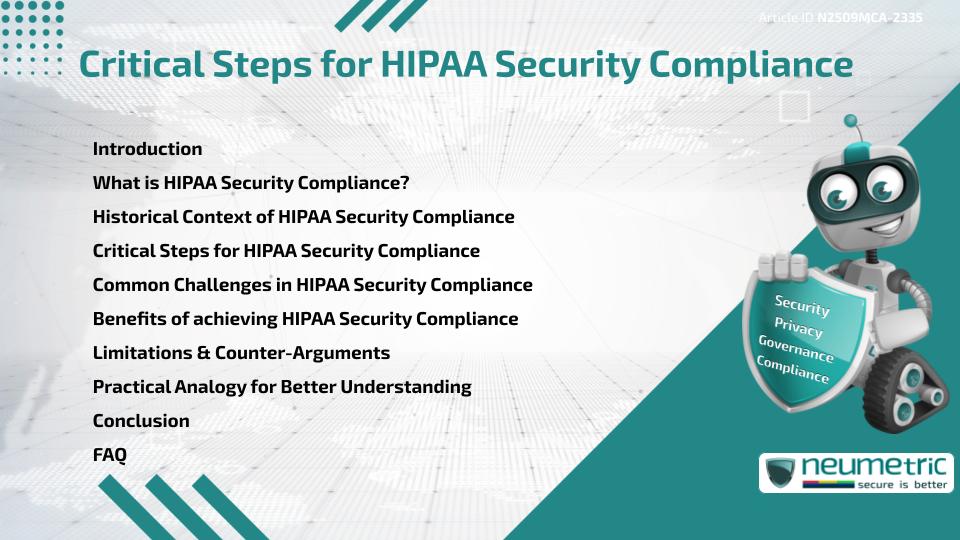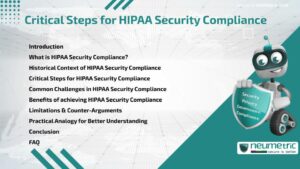Table of Contents
ToggleIntroduction
HIPAA Security Compliance ensures that Healthcare Providers, Insurers & their Partners protect Patient Information with strict safeguards. The Health Insurance Portability & Accountability Act [HIPAA] requires Organisations to secure Electronic Protected Health Information [ePHI] against unauthorized access, misuse or loss. Achieving compliance involves implementing administrative, physical & technical safeguards, conducting regular Risk Assessments & maintaining ongoing training. This article explores the critical steps for HIPAA Security Compliance, its historical context, benefits, challenges & practical examples that help simplify this complex but essential requirement.
What is HIPAA Security Compliance?
HIPAA Security Compliance refers to adherence to the HIPAA Security Rule, which sets national standards for protecting ePHI. This rule applies to covered entities such as hospitals, clinics & insurance companies, as well as business associates like IT vendors & billing services. Compliance ensures data confidentiality, integrity & availability. In simpler terms, it ensures that Patient Records are protected like valuables in a safe, with access granted only to authorized individuals.
For more on the HIPAA Security Rule, see HHS.gov.
Historical Context of HIPAA Security Compliance
The HIPAA Act was enacted in 1996 to improve the portability of health insurance & standardize electronic transactions. The Security Rule, implemented in 2003, focused specifically on safeguarding electronic health records. Over time, increasing data breaches & the rapid digitization of health records reinforced the importance of compliance. This historical context highlights why HIPAA Security Compliance remains a cornerstone of Healthcare Privacy.
Critical Steps for HIPAA Security Compliance
Achieving HIPAA Security Compliance requires a structured approach. The critical steps include:
- Conducting Risk Assessments: Identify Vulnerabilities in systems, processes & human behavior.
- Developing Policies & procedures: Clear documentation guides Employees on how to handle ePHI securely.
- Implementing safeguards: Administrative measures (like training), physical controls (like secure access to facilities), and technical protections (like encryption).
- Training staff: Every Employee must understand their role in compliance.
- Monitoring & auditing: Regular reviews ensure ongoing compliance.
- Incident Response planning: Organisations need clear protocols for managing data breaches.
Common Challenges in HIPAA Security Compliance
Organisations often struggle with balancing Compliance Requirements against operational efficiency. Small Providers may lack the budget for robust IT systems, while large Organisations face complexity in managing vast amounts of data. Staff negligence, outdated technology & evolving Cyber Threats also create challenges. Despite these hurdles, compliance is non-negotiable as penalties for violations can be severe.
See examples of enforcement at OCR.gov.
Benefits of achieving HIPAA Security Compliance
Compliance is not just about avoiding penalties. It builds patient trust, enhances reputation & strengthens Cybersecurity. By following HIPAA Security Compliance steps, Organisations minimise Risks of data breaches, which can save millions in damages. Just as wearing a seatbelt prevents injuries during accidents, compliance provides a protective cushion against Threats.
Limitations & Counter-Arguments
Some argue that HIPAA Security Compliance creates excessive administrative burdens & stifles innovation in Healthcare IT. For instance, stringent requirements may slow down the adoption of new technologies. While these points have merit, they do not outweigh the critical need to protect sensitive health information. The balance lies in finding efficient compliance strategies without compromising security.
Practical Analogy for Better Understanding
Think of HIPAA Security Compliance like home security. Administrative safeguards are the family rules about locking doors, physical safeguards are the locks & alarm systems & technical safeguards are the surveillance cameras. Together, they protect what matters most. Similarly, HIPAA compliance layers safeguards to ensure Patient Data remains secure from every angle.
Conclusion
HIPAA Security Compliance is essential for protecting Patient Information, maintaining trust & avoiding legal penalties. Despite its challenges, the steps to compliance are straightforward when approached systematically. From Risk Assessments to staff training, each step reinforces a culture of accountability & security.
Takeaways
- HIPAA Security Compliance ensures protection of ePHI.
- Compliance requires Risk Assessments, safeguards, Policies & training.
- Benefits include patient trust, reputation & reduced breach Risks.
- Challenges include costs, complexity & administrative effort.
- Despite limitations, compliance remains a legal & ethical necessity.
FAQ
What does HIPAA Security Compliance mean?
It means following the HIPAA Security Rule to protect electronic patient health information through safeguards & Policies.
Who needs to follow HIPAA Security Compliance?
Covered entities like Healthcare Providers & Insurance Companies, as well as business associates such as IT Vendors & Billing Services.
What are the three types of safeguards in HIPAA Security Compliance?
Administrative, Physical & Technical Safeguards are required to secure Patient Information.
How often should Risk Assessments be conducted?
Risk Assessments should be conducted annually or whenever significant system changes occur.
What happens if an organisation fails HIPAA Security Compliance?
Organisations may face heavy fines, legal actions & loss of patient trust.
Is staff training required for HIPAA Security Compliance?
Yes, training is mandatory so staff understand how to protect ePHI & avoid violations.
How is HIPAA Security Compliance monitored?
Through audits, Monitoring Tools & reviews conducted by internal teams or external regulators.
References
Need help for Security, Privacy, Governance & VAPT?
Neumetric provides organisations the necessary help to achieve their Cybersecurity, Compliance, Governance, Privacy, Certifications & Pentesting needs.
Organisations & Businesses, specifically those which provide SaaS & AI Solutions in the Fintech, BFSI & other regulated sectors, usually need a Cybersecurity Partner for meeting & maintaining the ongoing Security & Privacy needs & requirements of their Enterprise Clients & Privacy conscious Customers.
SOC 2, ISO 27001, ISO 42001, NIST, HIPAA, HECVAT, EU GDPR are some of the Frameworks that are served by Fusion – a SaaS, multimodular, multitenant, centralised, automated, Cybersecurity & Compliance Management system.
Neumetric also provides Expert Services for technical security which covers VAPT for Web Applications, APIs, iOS & Android Mobile Apps, Security Testing for AWS & other Cloud Environments & Cloud Infrastructure & other similar scopes.
Reach out to us by Email or filling out the Contact Form…





